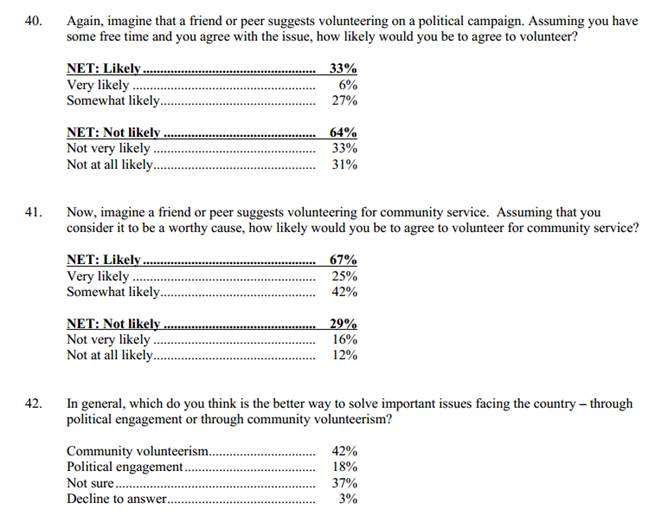Poll: Millennials Rejecting Obama, Dems and Turning to GOP? Or Kicking Politics Altogether?
A new Harvard poll of likely voters between the ages of 18 and 29) drives home what The Reason-Rupe Poll of millennials found this summer: The kids are politically up for grabs.
The national survey of 2,000 millennials found that among likely voters, 51 percent wanted a GOP takeover of the Senate while 47 percent preferred the Dems to keep the reins. In 2010, the respective numbers were 43 percent and 55 percent.
Reason's poll of millennials was titled "The Politically Unclaimed Generation" precisely because younger voters appeared to be far less partisan than older Americans (this, despite President Obama overwhelmingly winning the youth vote in 2008 and 2012). Of course they are, for at least two reasons. First, they're still working out their relationships toward politics, where they came from, and the like. As Emily Ekins and I discussed in our October cover story in Reason, it's a given among political scientists and sociologists that the decade or your twenties is a time when you search around for your identity.
Second, Obama and the Democrats have generally been awful to younger Americans. Obama has presided over a terrible economy and can no longer simply blame it all on Bush; in 2012, despite pulling 5 million more votes from the 18-29 group, he actually lost to Mitt Romney among 18, 19, and 20 year olds. And when you move past economic issues (as big as they are), Obama and the Dems have been truly rotten on issues they care a lot about. Obama and a number of high-profile Dems such as Hillary Clinton are objectively pro-NSA surveillance, massive drone attacks, and new and better wars. They've dragged their feet on gay marriage, typically having conversion experiences in the thick of electoral battlefields that only inspire cynicism. Despite other recent "evolutions" on issues such as pot legalization and immigration, he's got a terrible record on both those things, raiding medical marijuana joints in California at a quicker pace than George W. Bush and deporting more illegals than Dubya did too.
What's even more interesting—and from a libertarian POV, even more inspiring—in the Harvard poll is that millennials show genuine signs of bypassing politics and diving right into life itself. These kids don't want to waste their time on political campaigns. They want direct action:

That's good stuff, I think, and again it correlates with what Reason-Rupe found: Millennials are wary of politics but very interested in real life—63 percent told us that regulators favor special interests but 55 percent wanted to start their own businesses someday. Of course they are skeptical: Their entire lives have been lived in the relentless clusterfuck of the 21st century, where the right-wing, conservative failures of George W. Bush and the Republicans has been supplanted by the left-wing, liberal failures of Barack Obama and the Democrats.
As Ekins and I wrote, millennials are different from older generations when it comes to ideology.
…it would be a major mistake to think that millennials are the second coming of Murray Rothbard-style anarchism or even Reaganesque disdain for government solutions. While millennials clearly prefer free markets to state-managed ones, they are split on whether free markets are better at promoting economic mobility (37 percent) than are government programs (36 percent). Seven in 10 support government guarantees for housing, health care, education, and income for the truly needy. Yet almost as many—65 percent—think overall government spending should be reduced, and 58 percent favor cutting taxes.
From the point of view of older Americans and the political identities they inhabit, such seeming contradictions—government should guarantee income but cut spending?—come across as the folly of youth, an inability to hash out a coherent, systematic ideology. That sort of response will doubtless allow Republicans, Democrats, conservatives, liberals, libertarians, and progressives to keep selling what they've been selling for decades with minimal changes.
OK, millennials are willing to listen to new ways of thinking about politics and life more generally. The next step for libertarians (and conservatives, and liberals, etc.) is to explain exactly why and how their ideas and policies are more likely to create a world that is fun, interesting, innovative, fair, and workable.
I think we libertarians can do that, don't you?


Show Comments (240)